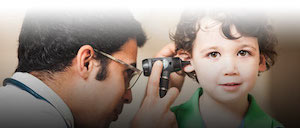

Having Trouble Hearing? University of Utah Health's Speech-Language-Hearing Clinic Can Help
No matter your age or your level of hearing loss, you can get help. University of Utah Health’s Speech-Language-Hearing Clinic in Research Park offers access to audiologists for adults and children suffering from hearing challenges, while speech-language pathologists can evaluate for speech, language, or feeding problems.

Author: Julia Lyon
Hearing loss affects a huge swath of the American population. According to the National Institute of Deafness and Other Communication Disorders (NIDCD), 48 million Americans between the ages of 20 and 69 have hearing challenges, while 28.8 million of them would benefit from hearing aids. Among the population of Americans 70 and older, less than 30 percent of those who need hearing aids have ever used them.
No matter your age or your level of hearing loss, you can get help. University of Utah Health’s Speech-Language-Hearing Clinic in Research Park offers access to audiologists for adults and children suffering from hearing challenges, while speech-language pathologists can evaluate for speech, language, or feeding problems.
“Our aging population is growing,” says Mary Lytle, assistant professor and coordinator of the audiology clinic. “Think about the segment of the population 65 and older—our growth of audiologists is not keeping up with that. This is going to be a field that’s in demand.”
“Folks with hearing loss that goes untreated tend to sit in the corner and don’t engage with their families anymore.”
Mary Lytle
Positioned to Meet Demand
U of U Health’s Speech-Language-Hearing Clinic is now positioned to meet that demand. Operating as a College of Health teaching program, graduate student clinicians perform evaluations while supervised by clinical faculty. The clinic also evaluates and treats children with speech or language delays, Autism Spectrum Disorders, Down Syndrome, feeding issues, stuttering, learning difficulties, and Childhood Apraxia of Speech.
In addition, the clinic provides speech-language evaluations and therapy services for people requiring transgender voice therapy or those with acquired neurological disorders such as Aphasia, traumatic brain injury, and degenerative neurological disorders such as ALS, Parkinson’s Disease, and Alzheimer’s Disease.
Since hearing loss can lead to social isolation and depression, Lytle says that hearing aids can make a tremendous difference in someone’s life. “Folks with hearing loss that goes untreated tend to sit in the corner and don’t engage with their families anymore,” she says. “They don’t enjoy their grandchildren anymore.”
But hearing loss doesn’t just affect an older population. Many young Americans experience hearing problems earlier in life, although they might not understand their symptoms. The NIDCD says that half of young people use headphones to listen to dangerously loud music that could damage their hearing. Noise from work, live concerts, and sporting events can also contribute to long-term hearing loss.
How to Spot Signs of Hearing Loss:
- A need to increase the volume of the TV or radio
- Asking people to repeat their words
- Failing to understand phone conversations
- Experiencing problems with hearing comprehension at school or work
Outside of hearing loss, U of U Health’s Speech-Language-Hearing Clinic can help those who want custom ear protection for swimming or concerts. On the speech and language side, the clinic works with adults that have deficits after strokes to help them regain skills.
Speech pathologists can also evaluate children for articulation and language problems related to communication. Graduate students under the supervision of certified Speech Pathologists help to identify why a child may not talk, providing outlets to help the child express themselves. Speech pathologists will help children learn to communicate using any means possible, including voice, gesture, or an augmentative device.
“We’re big believers in early intervention,” says Julia Lidgard, associate professor (clinical), clinic supervisor, and speech pathologist. If a child is developmentally delayed and not putting words together by age 2, the clinic can evaluate the child and then talk to parents about how to expose the child to more language in the home.
Other programs for children include social skills group classes, preschool language groups, and an intensive stuttering clinic that operates in the summer. Other programs for adults include a book club for adults with aphasia and transgender voice therapy.
To make an appointment for hearing or speech issues, visit hear.utah.edu or call (801) 581-3506.